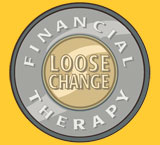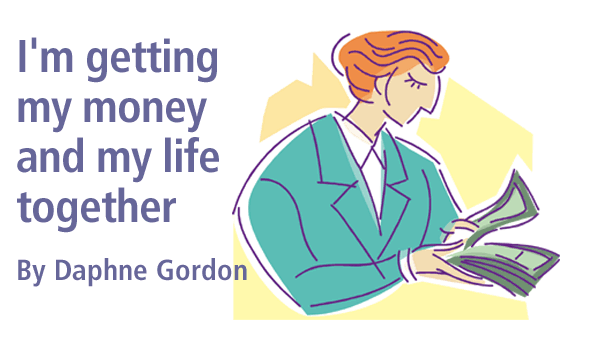Rampant Christmas consumerism has left me feeling nauseated. My bank balance is anaemic. Merely thinking about January's mortgage payment is giving me a headache.
There's an epidemic of unconscious consumption going around, and I'm obviously afflicted, so I have decided to seek the help of a professional.
And I don't mean a financial advisor. I already have a conscientious money guy named, to whom I turn for occasional advice about tax issues and mutual funds. But he would probably fire me as a client if I had the nerve to be honest with him about how many pairs of shoes I bought last season, which I do not.
The kind of professional I'm talking about is a counselor who can help me figure out why it is that I spend money I know I don't have on things I don't need, and how I can get over my lifelong fear of credit card bills.
Her name is Amanda Mills, and as a financial expert and a former crisis counselor, she's going to help me explore the place where my emotions and my money meet.
I'm hoping that if I figure out why, when I'm feeling happy, or sad, or in love or lonely, I completely lose control over my spending habits, I might be able to invest my 2004 income in something other than accessories.
And I'm not alone. Mills, who runs her unique consultancy business, called Loose Change, out of a cozy office on College St., says this is a busy time of year for her.
There are a couple of times in the year when people really look at themselves and the money practices aren't working for them: “New Year's and September,” says Mills who will offer workshops about emotions and money starting this month. (For information call 416-466-4435)
Mills started her business two years ago in response to a gap she saw in the financial management field, which tends to focus solely on the numbers and avoids discussion of emotional issues that create our attitudes to money.
“Our society has money over here and finances over there,” she says “and they don't ever seem to come together. People go into financial fields because they are exacting; they aren't really interested in emotions. Then you have people working in the arts and the healing fields and they can't think about money.”
But Mills believes money and emotions are intimately connected. “The first thing I say when people come into my office is No shame, no blame,” she says. “I have clients who don't even know the rate of interests on their credit cards.
There's a level of guilt so that they can't even look at their bills. There's too much shame. But shame really undermines what it is you're trying to do.”
After polling a few psychologist friends, Mills believes most people don't talk to their mental health professionals about money. “They might talk about the fact that they're really worried about it,” she says. “But they can't get specific. They steer right around the topic. They jump right into talking about childhood sexual abuse, but they aren't comfortable talking about money.”
It's not easy for many of her clients to open up, so Mills aims to create a safe environment in her office by drawing heavy curtains across the large windows, keeping open a clear path to the door, and offering lattes.
The she asks for a complete financial picture, including debts, expenses, bank balances and investments. Which is hard enough. But beyond the numbers, she wants to know the whole back story, including how their parents handled cash, since most of our beliefs about money come directly from family, she says. She also asks her clients to identify financial goals and possible hurdles to attainment of those goals.
The thing that sets Mills apart from her more numbers-based colleagues is that she's not all about the black line. Her goal isn't to help her clients have more money; she aims to help them be free of money worries so they can do the things they really want to do.
It typically takes three one-hour sessions to get on track toward the goal, says Mills.
After my first session and many soothing words from Mills, I've realized I'm not in as deep as I thought. But one major thing came out of the session: I have no idea how much money I spend, or on what.
This is a major obstacle to reaching my goal, she says, because I won't be able to clean up my spending habits unless I know exactly where my weaknesses lie. So she assigned me some homework. I'll have to record every last penny I spend for an entire money categorizing each purchase into columns that I create myself, based on my own life. For example, because I spend a lot on clothing, she advised me to create several sub-categories, including clothes for work, and for parties, and for yoga. I'll have more than one footwear category.
At the end of the month, Mills suggests I add up the categories and then figure out, based on my salary, how many hours I worked to earn enough money to buy 12 tank tops. This is intended to help me determine whether I really got my money's worth for those purchases.
I have tried this process before and failed miserably. But Mills says my expenses will probably naturally decrease by 20 per cent if I'm forced to account for my purchases. So that makes the pain of facing the truth seem worth it.
Other quick tips Mills provided included using cash exclusively, and quite literally putting my credit card on ice.
“Put your credit card in a glass of water and put it in the freezer,” she suggestion. “You'll have to thaw it before you can use it.”
(I have since done so and have wondered several times whether a credit card would be destroyed in the microwave, but so far resisted the temptation.)
She also recommended a book called Your Money Or Your Life, a tome penned more than 10 years ago by Joe Dominguez and Vicki Robin. It's still the authoritative text on the topic of financial psychology, and it's endorsed by Oprah Winfrey, so I forked out $22.50 cash for the paperback. I'm also considering starting a self-help group about money. For advice on how to do that, I'll consult www.newroadmap.org a non-profit organization founded by the authors of Your Money Or Your Life.
Whether I'll be able to find three or four willing girlfriends is another story. But I do believe that lack of attention to money management is what's holding women back from true equality in our society, so I'll appeal to my friends on the grounds that they'll be advancing the noble cause of feminism.
Or, on second thought, maybe I'll just offer crantinis all around.
THE TORONTO STAR, December 27, 2003
To download a copy of this article click here.
If you have Acrobat installed on your computer the application will open automatically, if you require Adobe Acrobat please visit www.adobe.com, download the free Acrobat Reader and then return to this page.
Return to About Loose Change Page
LOOSE CHANGE INC.
720 Spadina Avenue, Suite 513
Toronto, ON • M5S 2T9
Tel: 416-466-4435 • Fax: 416-466-3818
Email: info@loosechange.ca


